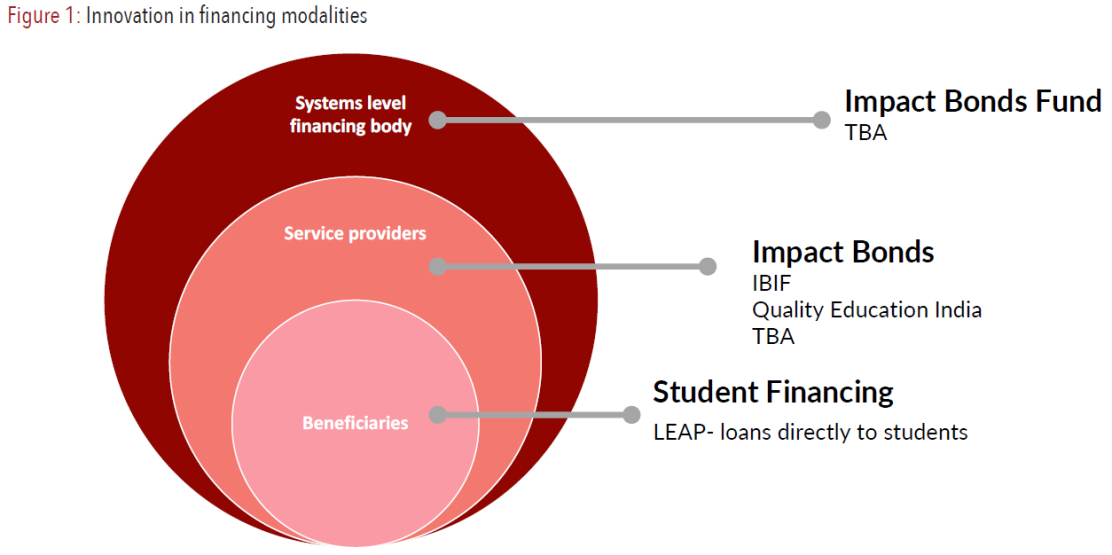About IFE-2-Leave No One Behind
The proposed IFE-2-Leave No One Behind project aims to have the following impact on the field of global education:
- An Increased amount of financing, effectiveness and cost-efficiency of education programs which improve the educational opportunities for marginalised and vulnerable children and youth.
- Evidence-based policy dialogue on the use of innovative finance mechanisms for reaching vulnerable and marginalised groups in low, lower-middle-income, as well as Fragile and Conflict-Affected Countries.

The IFE-2-Leave No One Behind project will fund the implementation (through matching funds from consortium partners) and conduct impact evaluation research on 1) – Lending for Education in Africa (LEAP), Impact Bond Innovation Fund (IBIF), Quality Education India (QEI) Development Impact Bond, and two additional upcoming initiatives – implemented by UBS Optimus Foundation (UBS OF) and Volta Capital in Ghana, India, Kenya, Rwanda, Sierra Leonne, South Africa, Tanzania, and Uganda. The three university partners – Graduate Institute of International and Development Studies – NORRAG (IHEID-NORRAG) in Geneva, University of Cape Town-Graduate School of Business (UCT-GSB) in Cape Town, and Tata Institute of Social Sciences – Centre for Education Innovation and Action Research (TISS-CEIAR) in Mumbai – will conduct mixed-method impact research on which and under what conditions do innovative finance mechanisms, arrangements, and programme elements are likely to produce educational benefits for vulnerable and marginalised student populations.
The research component of the project will test the following hypothesis:
Innovative financial mechanisms contribute to additionality in education financing. Mechanisms that focus on outcomes, adopt private sector management principles, and utilise the private capital market increase the financing available to reach the targets for SDG4 for quality education (Leave no One Behind).
The overall research questions that will be examined are:
- To what extent and why do impact bonds and the social lending scheme produce better development results in education (in particular for the marginalized population) than traditional funding approaches? Does the introduction of financial returns into education service delivery lead to the exclusion of the hardest population to reach? Does the concept of outcome-based funding provide the adequate incentives in order to foster quality education in our partner countries?
- Are innovative financing mechanisms more cost-efficient than traditional funding in education, including all related costs (for example costs for setting up and managing the impact bonds, returns to be paid to the investors, etc.)? Does outcome-based payment improve intervention effectiveness in education? In case the innovative financing mechanisms are costlier, is the higher cost of the innovative financing mechanism compensated by improved effectiveness?
- Does engaging private investors reduce and/or transfer financial risks for social development projects to private investors, and thereby increase the efficiency of public funding? What are the different types of risks born by various stakeholders (national governments, bilateral and multilateral donors, private investors, service providers and beneficiaries) with the introduction of private investment?
- Are innovative financing mechanisms attracting new funds into education and under which conditions? Can innovative financing increase long term education funding and improve the quality of interventions for SDG4?
- Can impact bonds and the social lending scheme create productive public-private collaborations in education that can be maintained beyond investment timeframes? Can impact bonds and the social lending scheme have a systemic impact? Are the new approaches tested within the impact bonds/the social lending scheme being taken up and replicated at the level of a country’s education system?
Research approach and methodology
The five initiatives differ in proximity to the ultimate beneficiary population (Figure 1). These initiatives provide a wide range of innovative finance approaches used to bring additional financing to education and improving efficiency and effectiveness of education programming. They range from 1) direct education loans to youth in east Africa (LEAP) to, 2) stand-alone Social Impact Bonds (IBIF 1.0 and Quality Education India) for service providers who then deliver education programmes to the target populations, to 3) Impact Bond Funds (upcoming funds in Africa) that catalyse pooled results-based financing from donors and governments to finance programmes for the beneficiaries through service providers.
To evaluate the impact of innovative financing on bringing more and better financing for SDG4 (inclusive and equitable quality education) IFE-2-Leave No One Behind will use a contribution analysis approach to systematically gather evidence on the causal mechanism and examine whether the initiative has added value or other mechanisms are causing the results. The mixed-method data collection and analysis with be conducted through randomised controlled trials/quasi-experimental methods and qualitative methods to develop formative and summative evaluation reports. The individual initiative impact evaluation will feed into a meta-evaluation which will combine the findings to compare and contrast how the key features of innovative financing bring additional funds to the sector and/or improve the effectiveness of existing funds in reaching the targets of SDG 4.
